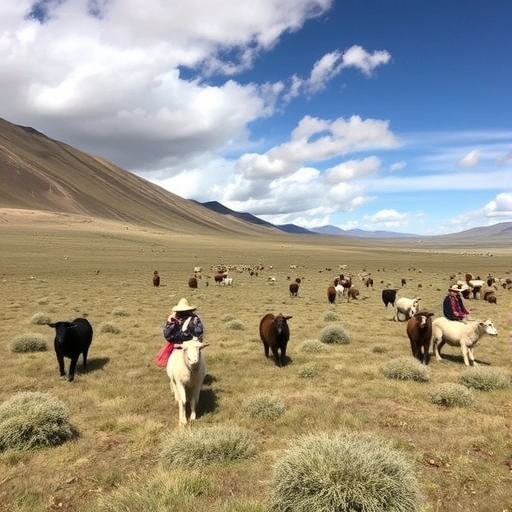The Qinghai-Tibetan Plateau, renowned for its breathtaking landscapes and diverse ecosystems, faces unprecedented challenges due to climate change and unsustainable agricultural practices. A groundbreaking study conducted by a team of researchers, including Ye, Wang, and Li, highlights the urgent need to reorient agricultural practices in this vital region. Their findings present a unique opportunity not just for local sustainability, but also for the broader implications that transcend geographical boundaries.
Agriculture on the Qinghai-Tibetan Plateau has traditionally relied on practices that are now being recognized as inadequate for maintaining ecological balance. The researchers delve into the unique climatic and geographical features of the Plateau, which contribute to its fragile environment. With persistent pressures from climate variability, soil degradation, and loss of biodiversity, the study underscores an intrinsic connection between the health of agricultural systems and environmental sustainability.
The study’s focus extends to the socio-economic dimensions of agricultural practices. The authors brought to light that farmers on the Plateau are not just facing environmental challenges but also socio-economic ones. The adaptation and adoption of sustainable practices are often hindered by economic constraints and lack of access to modern agricultural resources. This dual challenge calls for significant policy interventions that facilitate transitions towards environmentally sustainable and economically viable farming practices.
Ye and colleagues conducted extensive field studies and data analysis, noting shifts in climate patterns that have direct consequences on crop yields. They emphasized the urgent need for sustainable irrigation systems that conserve water and maintain soil health. As groundwater resources dwindle, the implementation of modern irrigation techniques becomes crucial. Solutions such as drip irrigation, which minimizes evaporation and runoff, are recommended to enhance water efficiency.
Moreover, the researchers advocate for agroecological practices that combine traditional knowledge with contemporary scientific insights. They argue that reinforcing local knowledge systems allows for context-specific strategies that can address the unique challenges of the Plateau. Crop rotation, intercropping, and organic farming practices are seen as essential strategies to restore soil fertility and reduce dependency on chemical fertilizers, fostering a healthier ecosystem.
The team’s analysis also points to the interdependence of agriculture and biodiversity in the region. The loss of indigenous plant species due to monoculture practices threatens not only biodiversity but also the resilience of agricultural systems. By fostering crop diversity, farmers can enhance their resilience against pests and diseases while promoting a richer ecosystem. The study outlines how integrating native crops into farming systems can bolster both food security and ecological health.
In addressing market access, the study underscores the importance of developing local supply chains that empower farmers. By strengthening local economies through direct-to-consumer markets and supporting cooperative models, the researchers argue that farmers can gain a fair return on their products. This approach not only enhances food security but also builds community resilience against external economic shocks.
The authors also highlight the significant role that policy frameworks play in shaping the agricultural landscape on the Qinghai-Tibetan Plateau. Comprehensive policies that incentivize sustainable practices and provide financial support for farmers transitioning to greener technologies are essential. They call for collaborative efforts between government agencies, NGOs, and local communities to create a conducive environment for sustainable agriculture.
Digital technologies also present an exciting avenue for innovation in agricultural practices on the Plateau. The researchers discuss the potential of precision agriculture, which employs data analytics and remote sensing technology to optimize farming practices. These insights can enable farmers to make informed decisions about planting, irrigation, and pest management, ultimately leading to increased productivity and sustainability.
The shift towards sustainable agricultural practices is not only an ecological imperative but a moral one. The researchers emphasize that the livelihoods of millions of people depend on the health of the Plateau’s agricultural systems. The findings advocate for a holistic approach to development, one that prioritizes the environment while ensuring economic viability for local communities.
In conclusion, the study led by Ye, Wang, and Li serves as a clarion call for immediate action. The urgent need to reorient agricultural practices on the Qinghai-Tibetan Plateau is not merely a regional concern; it reflects a global challenge. As nations grapple with the impacts of climate change and food insecurity, the lessons learned from this unique ecosystem can offer valuable insights for sustainable development worldwide. The researchers posit that embracing sustainability is not simply an option—it is an essential pathway for future generations.
Subject of Research: Sustainable agricultural practices on the Qinghai-Tibetan Plateau.
Article Title: Reorienting agricultural practices on the Qinghai-Tibetan Plateau for internal–external sustainability benefits.
Article References: Ye, C., Wang, S., Li, C. et al. Reorienting agricultural practices on the Qinghai-Tibetan Plateau for internal–external sustainability benefits. Commun Earth Environ 6, 914 (2025). https://doi.org/10.1038/s43247-025-02864-3
Image Credits: AI Generated
DOI: https://doi.org/10.1038/s43247-025-02864-3
Keywords: Qinghai-Tibetan Plateau, sustainability, agriculture, climate change, agroecology, biodiversity, policy interventions, precision agriculture, local economies.




